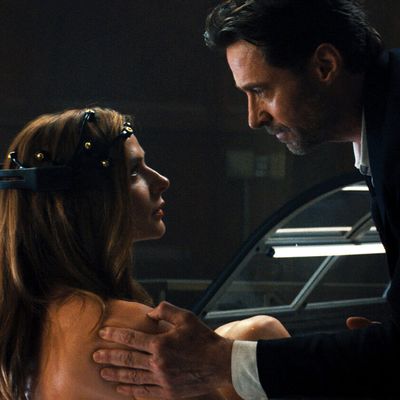
Reminiscence is set in a half-drowned Miami where rising ocean levels have flooded the streets, but, midway through, the movie wanders off to a similarly waterlogged New Orleans, which happens to be home to a Chinese American gangster named Saint Joe. In the near future of the film, the drug of choice is called baca, and Joe, who’s played by Daniel Wu, has built a mini-empire off the pills and acquired a few dirty cops on the way. He’s only a secondary baddie in Reminiscence, another obstacle for Nick Bannister (Hugh Jackman) to contend with on his journey to figuring out what’s become of his missing lover, Mae (Rebecca Ferguson). And yet, in his brief appearance, Joe’s so much more vivid than Nick, who’s a noir hero rejiggered for a sci-fi setting, a sad-eyed veteran of a recent war whose elements are left vague.
Joe laces his speech with Mandarin — menacingly calling foes pengyou, and saying things like “the pleasure shi wo de” — in a style so flagrantly inorganic it goes from being silly to reading as a challenge, a dare to outsiders to keep up. He didn’t serve, having instead been rounded up as part of an equally unexplained but familiar-sounding internment made even more nightmarish by the levees breaking. All these provocative details are tossed out in passing, as though the rote shootout that follows is more interesting. Reminiscence is the damnedest thing — a movie filled with promising concepts it doesn’t get around to exploring, because it’s dedicated to a romantic mystery that’s never very romantic or mysterious.
Some of those concepts are familiar — Reminiscence, the directorial debut of Westworld co-creator Lisa Joy, is itself reminiscent of plenty of past movies. The technology that Nick specializes in, in which a subject relives memories that are simultaneously projected onto a screen or holographic strands, recalls Strange Days or The Final Cut, while the sci-fi noir stylings can bring to mind Dark City. A degree of familiarity is unavoidable — the way the rich live in their own luxurious enclosed community, inhabiting dry land that’s maintained by pumping water out into the poorer neighborhoods, is out of every other dystopian story (as well as our dystopian real life). It’s what done with these ideas that matters, and while the concept of coastal cities being turned into ad hoc versions of Venice by climate change isn’t new, either, Joy renders it so evocatively onscreen that it feels like a waste when the film doesn’t linger on it more as something lived-in. Her Miami remains neon-lit in the face of the flooding, buildings partway underwater but still inhabited where they can be, residents gliding through what used to be South Beach in dinghies and going nocturnal to avoid the daytime heat.
Nick and his war buddy turned colleague, Watts (Thandiwe Newton), are set up in a moody old bank building in a neighborhood where the streets are flooded but still walkable. Nick got into the business as an interrogator during the war, and the pair still work with the DA when called upon to pry information out of the recollections of suspects and witnesses. Mostly, though, their clients are just regular people wanting to relive better days. When Mae makes a dramatic entrance at closing time, she claims to only want help finding her keys, though Nick is instantly smitten. He sees that she’s a singer in a nightclub, and looks her up at work and becomes involved with her — though in a recurring rug pull, our first glimpse of their meeting is revealed by way of Nick using his own technology to figure out how the relationship fell apart, because after a few months together, Mae cleared out her apartment and vanished without a trace.
To base a mystery around a relationship assumes that viewers are going to develop at least some degree of investment in that relationship, but Reminiscence is unable to give a reason for Mae’s hold over Nick, or for Nick as a protagonist himself. Ferguson’s a compelling presence who continues to get shortchanged by roles, though this film at least has the excuse that Mae’s seen almost entirely through the hazy lens of Nick’s imperfect, idealized memory. Jackman, on the other hand, can’t figure out Nick, who’s supposed to be tortured and fixated but also undeniably good. When it comes to non-sci-fi touchstones, Reminiscence might try to evoke classics like Laura and Vertigo, but there’s no actual darkness to Nick, nothing unsettling about his obsession. He cites the myth of Orpheus and Eurydice, but rather than grandly tragic, the pieced-together arc of their relationship is just predictable.
The movie feels trapped by its own influences, by its dogged commitment to its overdetermined genre mash-up of a main story, despite all of the interesting elements that pass by on the periphery — like the details of day-to-day life in a semi-submerged city, or the targets of that internment, or the ramifications of the memory technology, which we see at the end is being used as a kind of senior home of the mind. Reminiscence is all the more frustrating for its squandered promise, and for the way it consigns all of its best material to the sides, as though that were the only way to include it. When your primary characters are so flat and lifeless, why stick with them at all, especially when you have other things to focus on?
More Movie Reviews
- Shouldn’t Nosferatu Be Scarier?
- Companion Is a Perfectly Mean Romp
- Fernanda Torres Is a Subtle Marvel in I’m Still Here


